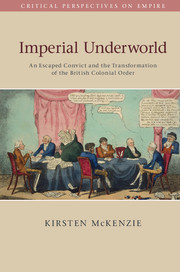Book contents
- Frontmatter
- Contents
- List of illustrations and map
- Cast of main characters
- Acknowledgements
- Map
- Introduction: ‘A soul reared in the lap of liberty’
- 1 ‘Plausible and audacious frauds’: The theatre of imperial politics and reform
- 2 ‘A Daemon behind the Curtain’: Reputation, parliamentary politics and political spin
- 3 Green-bag-makers and blood-hunters: Information management and espionage
- 4 ‘In return for services rendered’: Liberated Africans or prize(d) slaves?
- 5 ‘The dishonorable Court of Gothamites’: Corrupting abolition
- 6 ‘Under the cloak of liberty’: Seditious libel, state security and the rights of ‘free-born Englishmen’
- 7 ‘Unruly subjects’: Political removal and the problem of colonial constitutions
- 8 ‘A conspiracy of the darkest and foulest nature’: The placard affair
- 9 Bring up the body: The many escapes of ‘Alexander Edwards’
- Epilogue: An infamous end
- Bibliography
- Index
5 - ‘The dishonorable Court of Gothamites’: Corrupting abolition
Published online by Cambridge University Press: 18 December 2015
- Frontmatter
- Contents
- List of illustrations and map
- Cast of main characters
- Acknowledgements
- Map
- Introduction: ‘A soul reared in the lap of liberty’
- 1 ‘Plausible and audacious frauds’: The theatre of imperial politics and reform
- 2 ‘A Daemon behind the Curtain’: Reputation, parliamentary politics and political spin
- 3 Green-bag-makers and blood-hunters: Information management and espionage
- 4 ‘In return for services rendered’: Liberated Africans or prize(d) slaves?
- 5 ‘The dishonorable Court of Gothamites’: Corrupting abolition
- 6 ‘Under the cloak of liberty’: Seditious libel, state security and the rights of ‘free-born Englishmen’
- 7 ‘Unruly subjects’: Political removal and the problem of colonial constitutions
- 8 ‘A conspiracy of the darkest and foulest nature’: The placard affair
- 9 Bring up the body: The many escapes of ‘Alexander Edwards’
- Epilogue: An infamous end
- Bibliography
- Index
Summary
Charles Blair was widely recognised by both bond and free as a man of hot temper. William Cousins, a prize slave assigned to the Collector of Customs, testified that Blair ‘whips and flogs all the Prize Negroes in his service in a most cruel manner’, and that he had shot a prize slave named Jack in the hand as punishment for an attempted escape. So when Blair and merchant Lancelot Cooke got into an argument over the assignment of Jean Ellé, it was perhaps predictable that Blair would lose his temper. Blair might also have expected that his use of intemperate language and violent threats would have consequences. Managing the parameters of such public altercations provided routine business for local notaries like William Edwards.
What Blair clearly did not anticipate was that the insulted Cooke, advised by Edwards, would abandon the conventional social and legal remedies laid down for public insults in favour of a complaint to the Treasury in London. In going over the head of local authorities and involving the institutions of the imperial government, Edwards took the first step in transforming a dispute between two men into a much broader debate over national character.
Edwards's memorial to the Lords Commissioners of His Majesty's Treasury linked the particular offence against Jean Ellé and Lancelot Cooke to the general principles underpinning the abolition of the slave trade with devastating clarity:
The English Senate intended to have been the friend and protector of the wretched Negro; but in this case it has been the greatest misfortune. Here is a man well able to earn thirty-five rixdollars per month as a cook, who, on pretence of being taught a business, is bound, by the ruthless cupidity of His Majesty's servants, to serve the most valuable part of his life in the favourites of the Collector of Customs at Cape Town.… Your Lordships will feel how inconsistent is such conduct with the philanthropy that abolished Slave-dealing.
Through the violence of his language, the unfairness of his conduct in separating master from servant and the ‘violation of every principle of humanity towards the poor man’, Collector of Customs Charles Blair had betrayed the trust placed in him by the king, a position ‘in which equanimity of temper, humanity, disinterestedness and benevolence of heart, ought to shine in a superlative degree’ – all this ‘merely to supply Mr Bird's son-in-law with a cook’.
- Type
- Chapter
- Information
- Imperial UnderworldAn Escaped Convict and the Transformation of the British Colonial Order, pp. 130 - 158Publisher: Cambridge University PressPrint publication year: 2016



